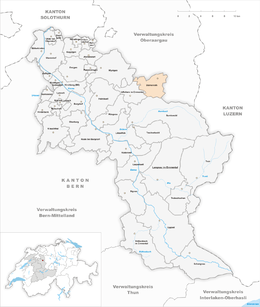Dürrenroth
| Dürrenroth | ||
|---|---|---|
|
||
| Coordinates: 47°5′N 7°47′E / 47.083°N 7.783°ECoordinates: 47°5′N 7°47′E / 47.083°N 7.783°E | ||
| Country | Switzerland | |
| Canton | Bern | |
| District | Emmental | |
| Government | ||
| • Mayor | Martin Wüthrich | |
| Area | ||
| • Total | 14.12 km2 (5.45 sq mi) | |
| Elevation | 698 m (2,290 ft) | |
| Population (Dec 2015) | ||
| • Total | 1,067 | |
| • Density | 76/km2 (200/sq mi) | |
| Postal code | 3465 | |
| SFOS number | 0952 | |
| Surrounded by | Affoltern im Emmental, Huttwil, Rohrbachgraben, Sumiswald, Walterswil, Wyssachen | |
| Twin towns | Klenčí pod Čerchovem (Czech Republic) | |
| Website |
www SFSO statistics |
|
Dürrenroth is a municipality in the district of Trachselwald in the Swiss canton of Bern.
Dürrenroth is first mentioned in 1275 as Rota. In 1326 it was mentioned as Durren Rot.
The area was probably first settled in the Late Middle Ages by a few, scattered farmers. In 1312 the Herrschaft of Balm, which include modern Dürrenroth, was donated to the Teutonic Knights' Sumiswald Commandry. In 1431 the village was given to the Bernese city of Burgdorf. About a century later, in 1528, Bern adopted the new faith of the Protestant Reformation. Despite opposition from the villagers, Dürrenroth was forcibly converted in the same year. In 1698 Bern finally bought the last property and rights over the village from the Teutonic Knights and it fully became a part of the Canton of Bern. Following the collapse of the Helvetic Republic and 1803 Act of Mediation it joined the newly created Trachselwald District.
The village church of St. Lawrence was built in 1486. Its current appearance dates from renovations in the 18th and 19th centuries.
During the 19th century many of the local farmers banded together to form dairy and cheese making co-ops. Throughout the 20th century agriculture remained important and as of 1990 there were still six active dairy cooperatives with three cheese factories. A road was built through the Rothbach valley in 1875, which connected Dürrenroth with nearby towns. The Ramsei-Sumiswald-Huttwil railroad opened a station in the municipality in 1908. Today while agriculture remains important, many residents work in construction or wood working or commute to jobs in neighboring towns.
...
Wikipedia




